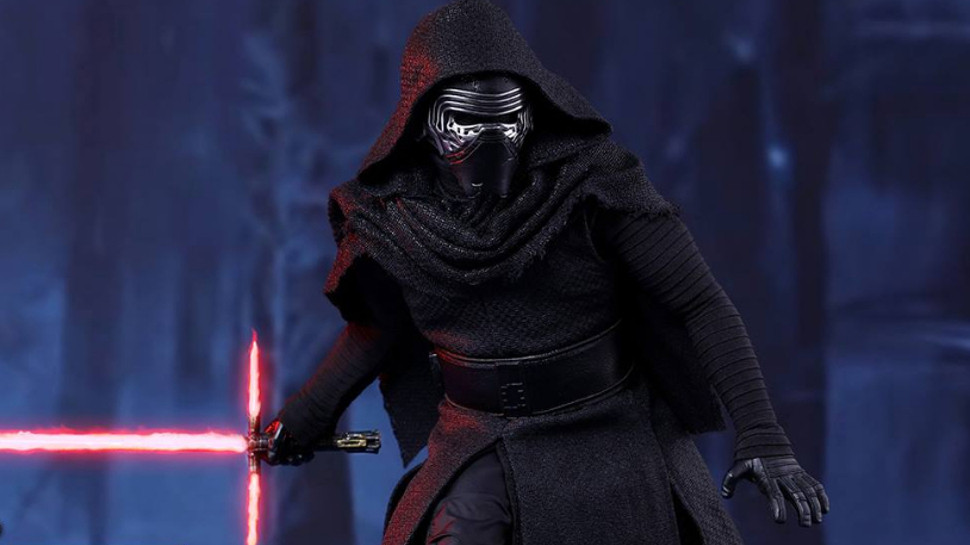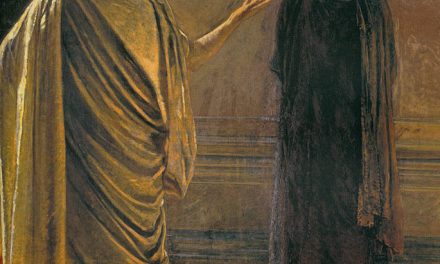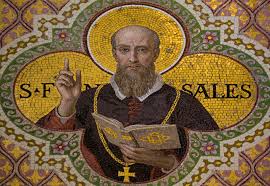I am a bit worried about Kylo Ren, the new villain from Star Wars: The Force Awakens. He seems to represent a different kind of evil than we have yet seen.
(Spoilers Ahead.)
Of course, Darth Vader was evil. In the original Star Wars: A New Hope, he did not hesitate to kill and choke people, even those on his own side. In The Empire Strikes Back, he had no qualms about torturing people and inflicting violence on his own son.
Yet, as the Star Wars prequels filled in his story, Darth Vader’s movement toward evil is actually an attempt to save those whom he loved. He could not save his mother when she was captured by the Tusken Raiders. He wanted to save his wife Padmé who was pregnant with his children, and Palpatine tempted him with the power of life over death. Even in Return of the Jedi, Darth Vader kills the Emperor in order to save the life of his son. Vader’s move to the dark side was to try to save those he loved.
It is a pattern strikingly similar to the heroes of Star Wars. Leia risks her life to send the Death Star plans to the rebellion to save her family, her planet, and all those under the tyranny of the Empire. Luke risks his life to destroy the Death Star, rescue Han Solo, and save his father. When push comes to shove, Han Solo chooses to help his friends and the Rebellion, even if it means losing money and risking his own life. Even Lando, after betraying Han, sets out to rescue him and then leads the Rebellion’s fleet against the Empire. At every moment, these characters set out to save those they care about. The main difference between them and Darth Vader is that they cared about a vast number of people—their friends and families but also strangers and enemies—whereas Darth Vader only cared about those in his immediate family.
Still, this little bit of love is what enabled Darth Vader to be saved at the end of Return of the Jedi. Vader ultimately cared about others, wanted good for them, and this small opening was big enough for him to ultimately reject evil for good.
The new villain Kylo Ren is a very different kind of evil. The parody Twitter account for Kylo Ren is quite amusing precisely because it captures his mentality: self-absorbed. Kylo Ren is seeking a sense of his own identity, his own place in the world. He has traded loyalty to family—Leia and Han—and his teacher and fellow students—Luke and the new Jedi order—to make himself important and powerful. He worships at the mask of Vader, not the true Vader that sought to save those he loved, but the image of Vader that was feared throughout the galaxy. In short, Kylo Ren seems to be about only himself, his own reputation, his own place in the universe.
This image of evil is troubling because it leaves little hope for redemption, no opening for the good. “It is better to rule in Hell than to serve in Heaven,” quipped Milton’s Satan. This seems to capture the proposition that Kylo Ren has bought into. There is no love, nothing that pulls him out of himself into relationship with others. Even those people that do care about him, like Han Solo, those that long to draw him back and reach out to do so, he kills. Why? Because it will make him one of the most powerful Knights of Ren.
Supreme Leader Snoke: There has been an awakening. Have you felt it?
Kylo Ren: Yes
Supreme Leader Snoke: The dark side, and the light. The droid you seek is aboard the Millennium Falcon in the hands of your father, Han… Solo.
Kylo Ren: He means nothing to me.
Supreme Leader Snoke: Even the Knights of Ren have never faced such a test.
Kylo Ren: By the grace of your training I will not be seduced.
Supreme Leader Snoke: We shall see, Kylo Ren. We shall see.
This choice for evil is troubling because it make the person less open to redemption. If, like Vader, the evil is chosen as the result of a misguided love, an attempt to overcome the fear of loss, there is hope. Greater love breeds greater courage, and courage can help to endure doing the good even in the face of threat. There is always hope for Vader given the story of his fall.
But when you define yourself through violence, by being willing to kill in order to demonstrate the kind of commitment you hold, what can turn you? If what you are is a killer, a person who sows death and destruction, stopping means the loss of yourself. It means you lose your sense of meaning and purpose, the very thing you were pursuing by means of death. So, how can one stop? Perhaps this will be the key question for the next movies. How is redemption wrought for those whose whole identity is rooted in violence? It seems an important question for us today as so much violence is done by those who define themselves by their willingness to kill others.
There was no answer to this in The Force Awakens. We will have to wait for Episodes VIII & IX for the Star Wars’ answer to this kind of evil. As a Christian though, I can only imagine that it will take some form of a Christ-like love.






I agree that KR represents a different form of evil, but the desire for greatness can also be seen as a form of disordered love. Its corresponding virtue would be magnanimity. (I also had the impression that KR was further from redemption than, say, Darth Vader, but because of his lack of discipline; I wondered if we were being encouraged to see him very much as his reckless father’s son.) I think the larger question has important implications in Christian formation: “daring greatly” and “dreaming big” are, at the core, *good* things.
Nice post, Jason. I suspect your instinct is right, but let me ask you to clarify something. You note that “when you define yourself through violence, by being willing to kill in order to demonstrate the kind of commitment you hold…” I have always been struck by the scene where Anakin goes to the Jedi temple and slaughters the younglings. It seems to get something very right to me: that abstract commitments don’t mean much until they demand concrete action of us. And concrete actions that demand real sacrifice (in this case, going against his own instincts to commit this horrific act in the name of his (misguided) commitment to love and life is a powerful way to get yourself (or someone else) off the fence and make them commit to a certain path. Once you are own that path a bit, you justify it, and (as you say of Kylo Ren), stopping means a loss of yourself. So, the invitation to you: can you say more to differentiate Kylo Ren and Darth Vader in this regard?
Great question Dana. I think you are correct in saying both Vader and Kylo Ren have to put their commitments into action. The main difference I see between them (and this is, of course, not knowing more of Kylo Ren’s background) is that Vader is doing it in hopes of getting the power to save Padme. He is willing to do anything, including the slaughter of the innocents, but it is because he cares for Padme. Kylo Ren’s killing is for his own identity. He does it to define who he is, making him a great knight of Ren. Vader can be redeemed by finding another way to protect those he loves. Kylo Ren, though, has to become a whole new kind of person to be redeemed. Vader seems moved out of a kind of self-defense, even though, when he starts down the path, it extends to his attempts to control the whole galaxy. Kylo Ren seemed moved out of desire for self importance, and it extend to his desire to set himself apart from everyone.
Nice analysis. I think you’ve brought us to the doorstep of another important difference between Vader and Kylo Ren. It pertains to their respective attitudes toward the dark side of the Force. As you note, Anakin/Vader’s turn to the dark side is initially motivated by a concern for a good: saving Padme. He’s also enticed by Palpatine’s argument that, to become a good and wise leader, one must study all aspects of the Force, not just the “dogmatic narrow view of the Jedi.” Two insights emerge here: first, for Anakin/Vader, the dark side’s value is instrumental—it’s useful for achieving authentic goods that are grounded independently of the dark side itself. Second, opting for the dark side need not entail a rejection of the light side (although certain misguided and distrustful defenders of the light side, i.e., the Jedis, may have to go). Kylo Ren, on the other hand, appears to desire the dark side for its own sake. He’s not out to use the dark side to pursue some good so much as he’s intent on losing himself in the dark side, in the belief that this is his good. Also, he sees the two sides of the Force as exclusive choices—thus, in desiring darkness, he prays to be rid entirely of the light. As you propose, Anakin/Vader’s stance is more “open” to salvation because there appears to be a commitment (unthematized, perhaps) to the light. Kylo Ren, however, has rejected the light. His sin seems more like the unforgivable sin against the Holy Spirit. It will indeed be interesting to see whether and how this kind of person can be rescued.